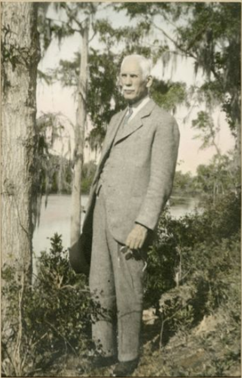Awards
- Honorary Degree - 1949
- M.A.
- Master of Arts
- Stone laying ceremony; Research wing; Riley Hospital
- Indianapolis, Indiana
- Presenter: Herman B Wells

John Marcus Dickey was born in 1859 near Longwood, Fayette County, Indiana. He attended the Indiana State Normal School, Terre Haute, Indiana, 1880-1883. He taught history and literature at the Fairmont, Indiana Academy, 1887-1889; was principal of public schools in Colorado Springs, Colorado, 1890-1892; and was director of the Rocky Mountain Lyceum in Denver, Colorado, 1892-1896.
Dickey was the first biographer, personal secretary and platform manager of famed Hoosier poet, James Whitcomb Riley. As Riley’s platform manager, Dickey spent much of his time booking Riley for speaking engagements and traveling the country promoting Riley’s poetry. A Saturday Evening Post article credited Dickey’s management of the poet’s tours with helping to make Riley a wealthy man. Dickey remained associated with Riley up until the poet’s death in 1916 when he was commissioned to write the poet’s biography, which he did in two works: The Youth of James Whitcomb Riley, 1919 and The Maturity of James Whitcomb Riley (1922).
Dickey lived in his “House of 30 Windows” on Bear Wallow Hill, Brown County, Indiana from 1905 on. After Riley died, Dickey spent time there writing Riley’s two-part biography. Among Dickey’s neighbors were the artist, T.C. Steele and his wife, Selma. Dickey’s years of personal association with Riley enriched his “labor of love” to produce this work. In 1942, Dickey and his wife, Isabelle, joined J.K. Lilly and his Lila, in selling their adjacent Brown County properties for $1each to Indiana University. Today, known as the Lilly-Dickey Woods, IU continues to preserve this land in its natural state and to use it for education and research in botany and the arts. It was this picturesque setting, full of color in the fall, that inspired Dickey’s writing of Riley’s biographies.
When Indiana University President Herman B Wells awarded Dickey an honorary Master of Arts degree in 1949 at the dedication of the cornerstone for the Riley Hospital Research Wing, he said to Dickey: “you were the first to give us a comprehensive and basic study which preserves much of the record that otherwise would have been lost” about Mr. Riley’s life and times.